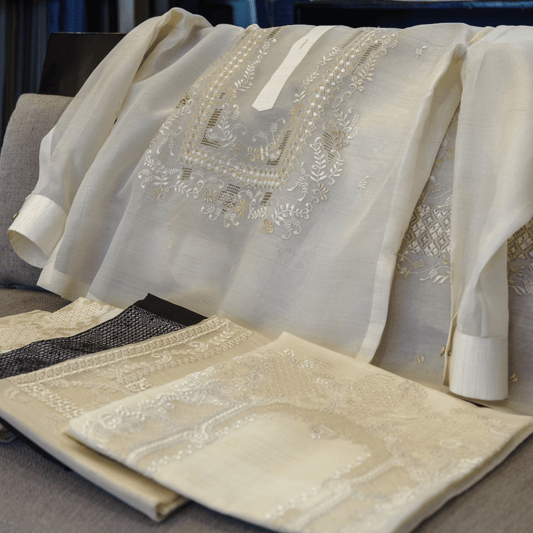Timeless Beauty in Our Filipiniana Collection
Step into the beauty of our heritage with our Filipiniana collection. Each piece is thoughtfully crafted to blend grace with tradition, offering you something truly special. Whether you’re preparing for a formal event, a cultural celebration, or simply want to embrace your Filipino identity, our collection invites you to celebrate in style. Every piece tells a story, your story, woven with the beauty and grace of our culture. Discover the dress that feels like it was made just for you and wear your heritage with pride.
-
Gossamer Pink Modern Sexy Filipiniana Dress - BR718
Vendor:Barong RepublicRegular price ₱4,999.00 PHPRegular priceUnit price per -
Classic Pink Duchess Filipiniana Dress :Timeless & Elegant - BR701
Vendor:Barong RepublicRegular price ₱5,200.00 PHPRegular priceUnit price per
Filipiniana Dresses Made With Pride for Filipinas
At Barong Republic, we celebrate being Filipino through our beautiful Filipiniana dresses, proudly made here in the Philippines. These dresses aren’t just for special events—they’re part of who we are. Each one is crafted with care by local hands, using traditional fabrics like piña and jusi. Whether it’s for a wedding, fiesta, or family gathering, our Filipiniana dresses blend the beauty of tradition with a touch of modern style, so you can wear your culture with pride.
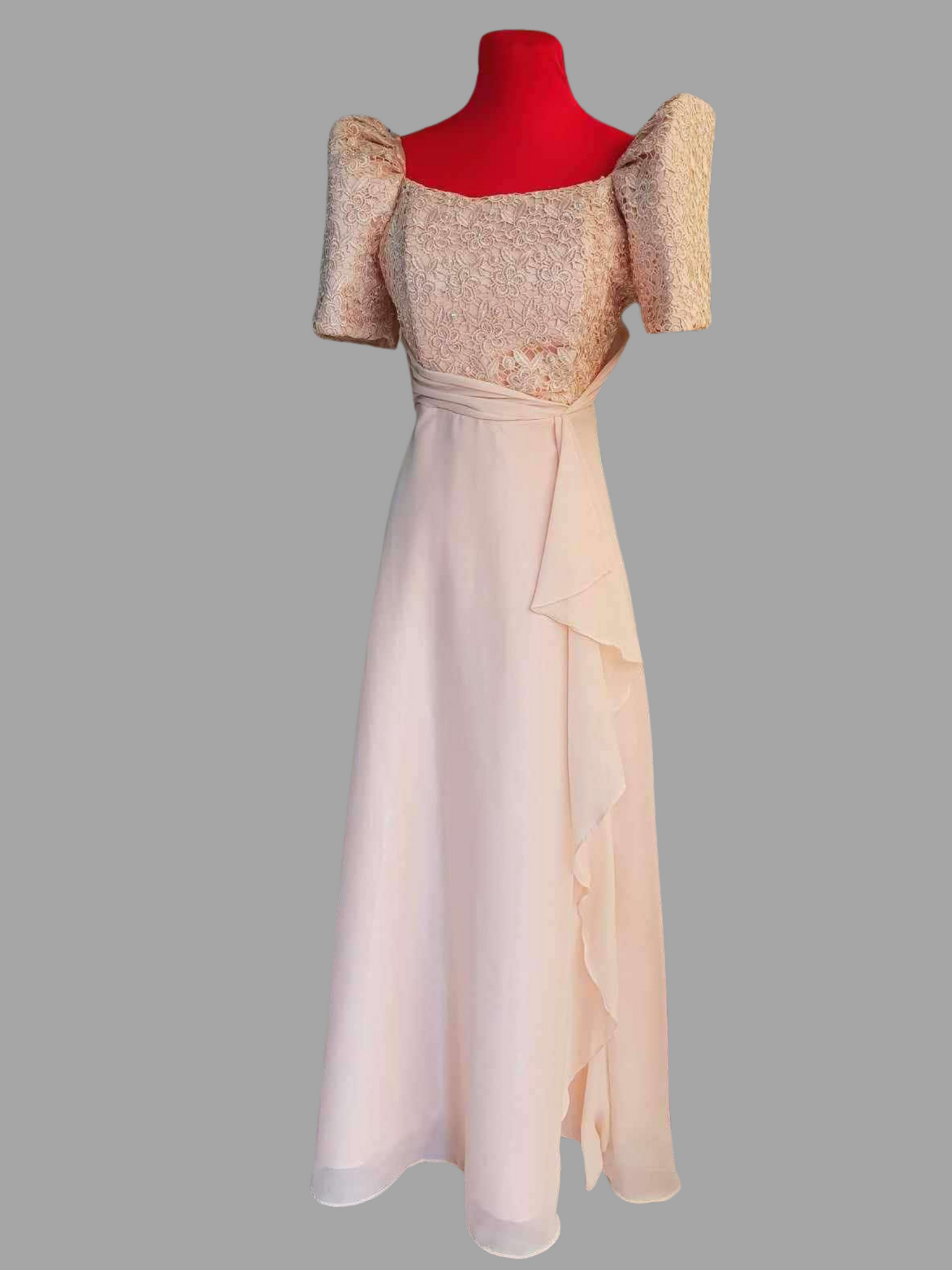
Filipiniana
Locally Handmade Filipniana Dresses
Each Filipiniana dress in our collection is made with love by skilled Filipino artisans. From the detailed embroidery to the carefully chosen fabrics, every piece reflects our rich heritage. When you wear a Filipiniana dress from Barong Republic, you’re not just wearing a beautiful dress—you’re supporting Filipino craftsmanship and honoring our traditions.
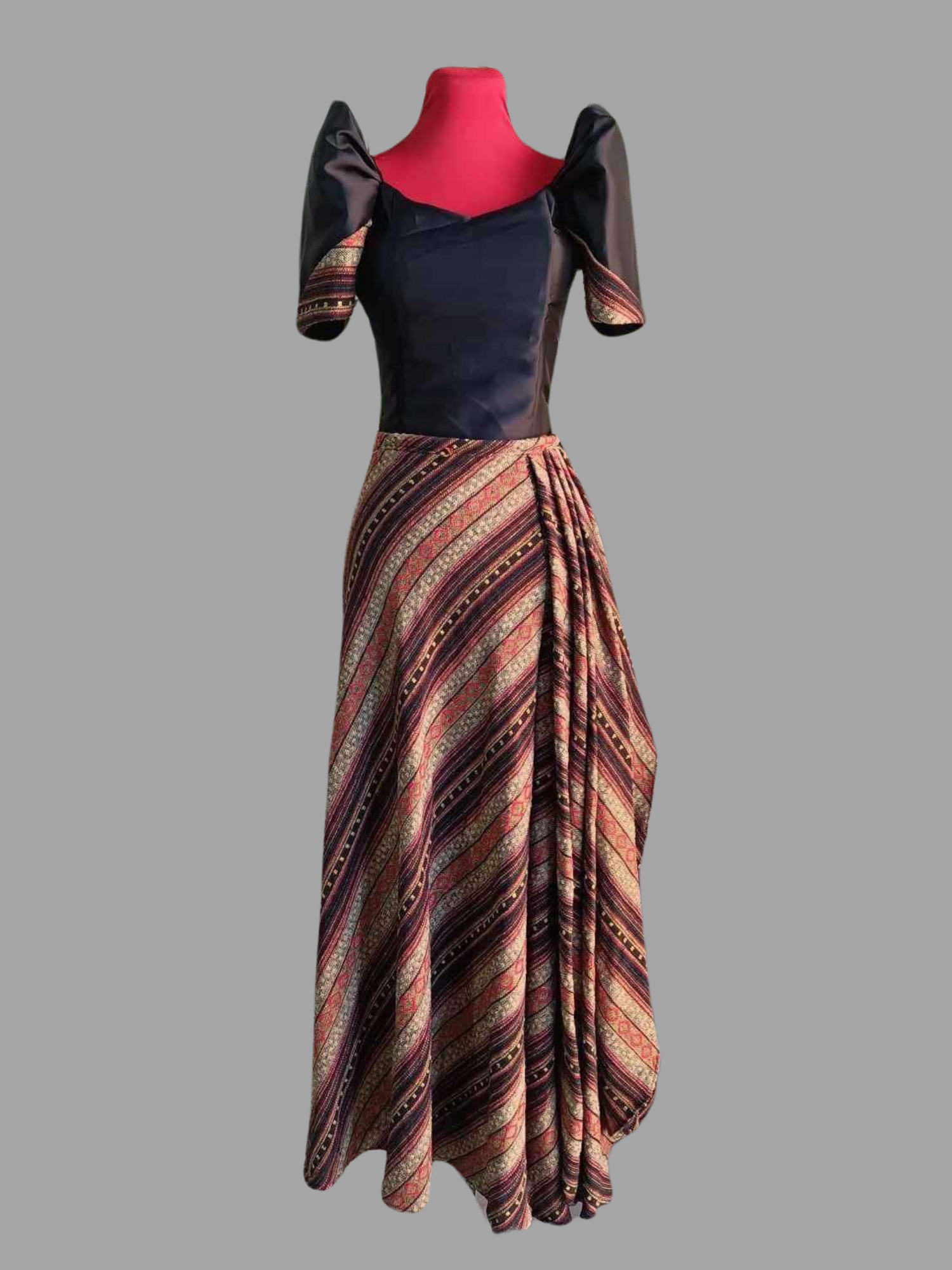
Filipiniana
Where Tradition Meets Style: Perfect for Any Occasion
Our Filipiniana dresses are designed to be worn at any special event. Whether it’s for a wedding, a fiesta, or a family celebration, these dresses allow you to showcase your Filipino pride. They combine the elegance of tradition with a modern twist, making sure you feel comfortable and stylish. Lightweight and breathable, our fabrics are perfect for the tropical weather, so you can enjoy the moment without worry.
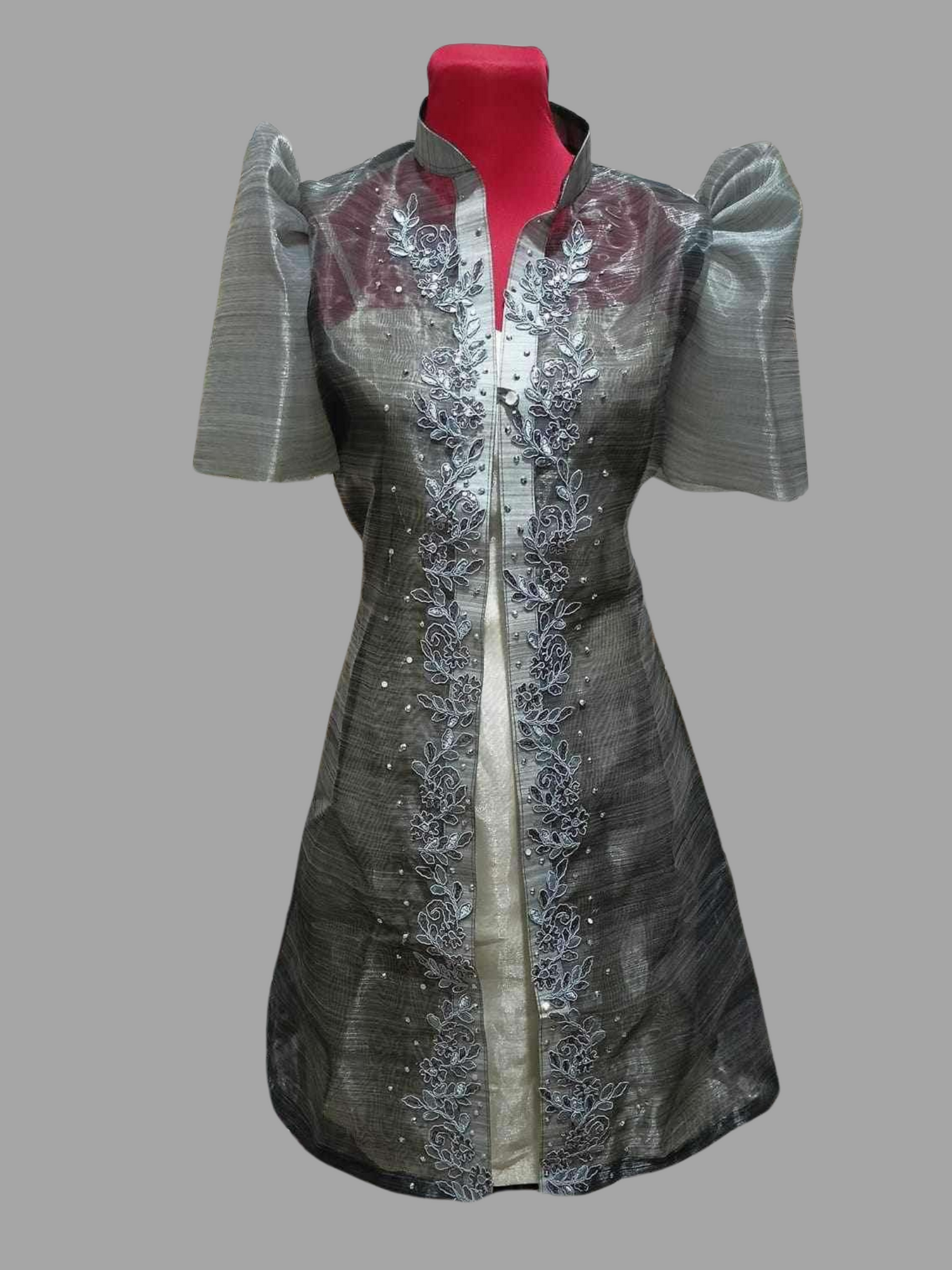
Filipiniana
Find the Filipiniana Dress That’s Right for You
At Barong Republic, we believe in keeping our traditions alive while embracing modern style. Each Filipiniana dress is crafted to reflect the grace and strength of every Filipina. Browse our collection and find the dress that speaks to you. Whether it’s for a formal event or just because you want to feel connected to our culture, we have something for you.
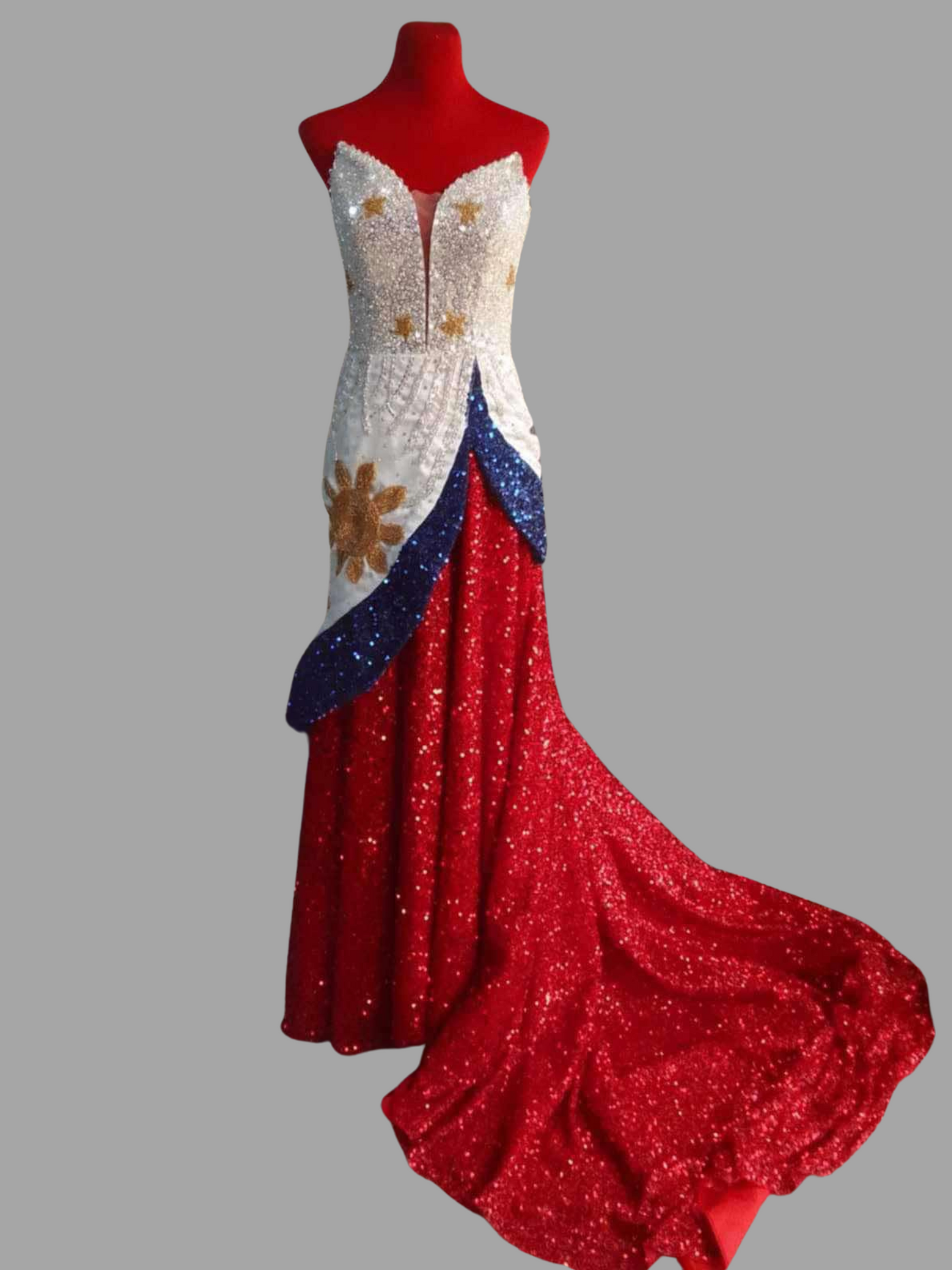
Filipiniana
Wear Your Culture with Pride
Choosing a Filipiniana dress from Barong Republic isn’t just about fashion—it’s about celebrating who you are as a proud Filipina. It’s about honoring where we come from, while embracing today. Each dress is made with heart, for women who want to carry our culture with them, wherever they go.
Shop our Filipiniana dresses today and bring home a piece of Filipino craftsmanship made with love, for Filipinas who are proud to wear their heritage.
Frequently Asked Questions
What exactly is Filipiniana attire?
Filipiniana attire refers to traditional clothing worn by Filipinos, particularly during formal events or cultural celebrations. It showcases the diverse regional styles, intricate designs, and rich cultural significance of the Philippines. The attire reflects the unique blend of indigenous and colonial influences that have shaped the country’s fashion history, making it an iconic representation of Filipino identity. Each garment carries its own story, often handcrafted with delicate embroidery and made from indigenous fabrics like piña or jusi.
What are the primary styles of Filipiniana attire for women?
For women, Filipiniana attire includes several distinct styles, each with its own cultural and historical background:
- Maria Clara: Named after a character from José Rizal's novel Noli Me Tangere, this style is known for its elegance, featuring a long skirt and a blouse with bell sleeves, often paired with a pañuelo or shawl.
- Terno: Known for its butterfly sleeves, the terno is one of the most iconic Filipiniana styles. It became popular in the 20th century and is often worn during formal events.
- Baro't Saya: A combination of a blouse (baro) and a skirt (saya), this is a traditional style that dates back to pre-colonial times and has evolved over centuries.
- Kimona: A lighter, simpler blouse often worn with a patadyong (a wraparound skirt), typically seen in the Visayan region.
These styles offer a way for women to embrace their heritage while making a fashion statement that is both timeless and meaningful.
Is there traditional attire for men in Filipino culture?
Yes, men traditionally wear the Barong Tagalog, a formal long-sleeved shirt often made from piña, jusi, or similar lightweight fabrics. The Barong Tagalog is known for its intricate embroidery, typically along the chest, and is worn untucked over a shirt. It is commonly worn during weddings, national holidays, and other important events. The barong represents Filipino craftsmanship and is recognized as the formal attire for men across the country.
When is it considered appropriate to wear Filipiniana attire?
Filipiniana attire is typically worn during:
- Weddings: Particularly if the theme embraces traditional or cultural elements.
- Cultural festivals: Such as Buwan ng Wika or Santacruzan.
- National holidays: Including Independence Day, where many Filipinos choose to wear Filipiniana to express pride in their heritage.
- Formal events: State dinners, diplomatic occasions, and awards ceremonies often feature Filipiniana as a formal dress code.
- Family gatherings: Milestone celebrations such as birthdays, debuts, and baptisms may also call for traditional wear.
Wearing Filipiniana attire during these events reflects respect for Filipino culture and enhances the significance of the occasion.
Can Filipiniana attire be customized to suit individual preferences?
Yes, Filipiniana attire can be tailored to meet individual preferences while still retaining its traditional essence. Many choose to personalize their outfits by selecting unique fabrics, colors, and embroidery designs that match their personal taste or fit the theme of a specific event. You can add embellishments or mix contemporary and traditional elements to create a look that feels more personal while honoring the cultural roots of Filipiniana.
What accessories can complement a Filipiniana outfit?
To complete a Filipiniana look, accessories play an important role:
- Salakot: A traditional wide-brimmed hat, often made of native materials like rattan or bamboo.
- Alampay: A shawl or scarf, commonly worn draped over the shoulders.
- Native jewelry: Pieces made from pearls, gold, or locally sourced materials like shell or wood add an authentic touch.
- Footwear: Women often pair their attire with traditional sandals or bakya (wooden clogs) to complete the ensemble.
These accessories enhance the cultural significance of the outfit and add personal flair.
Is Filipiniana attire specific to certain regions, or is it a national style?
While certain styles of Filipiniana attire, such as the baro’t saya or kimona, originate from specific regions, Filipiniana attire has evolved into a national symbol of Filipino culture. Regional variations still exist, but Filipiniana is now worn across the country and even internationally by Filipinos who want to celebrate their cultural heritage. It represents the Philippines as a whole, bringing together the diverse threads of the nation’s history and culture.
Can non-Filipinos wear Filipiniana attire without cultural appropriation?
Yes, non-Filipinos can wear Filipiniana attire as a way to appreciate and respect Filipino culture. However, it is important to do so with cultural understanding and sensitivity. Wearing Filipiniana at a Filipino event, celebration, or to honor a Filipino tradition is generally seen as a respectful gesture. The key is to be mindful of the cultural significance and approach it with genuine respect and appreciation.
How can I properly care for my Filipiniana attire to preserve its beauty and quality?
Caring for Filipiniana attire is essential to preserving its delicate fabrics and intricate designs. Here are some tips:
- Gentle washing: Handwash with mild detergent or opt for dry cleaning to avoid damaging delicate fabrics like piña or jusi.
- Proper storage: Store your Filipiniana in a cool, dry place away from direct sunlight, as exposure can cause colors to fade and fabrics to weaken.
- Hanging: If possible, hang the garment to maintain its shape and avoid creasing delicate embroidery or embellishments.
- Avoid harsh chemicals: Keep away from bleach or strong detergents that could harm the natural fibers.
With proper care, your Filipiniana attire can be preserved for many years, retaining its elegance and cultural significance.
What is the cultural significance of Filipiniana attire within the Philippines?
Filipiniana attire holds deep cultural significance in the Philippines as a symbol of national pride, identity, and resilience. It reflects the Filipino spirit through its intricate designs, craftsmanship, and the blending of indigenous and colonial influences. Wearing Filipiniana is a way of celebrating the country’s rich history, from its pre-colonial roots to its modern-day cultural heritage. These garments are often worn during important national celebrations, reinforcing a collective sense of pride and cultural continuity.
Learn More
Filipiniana: A Timeless Symbol of Filipino Grace and National Pride
The Filipiniana dress stands as a testament to the elegance, strength, and cultural pride of the Filipina. Worn on significant occasions like weddings, fiestas, and national celebrations, the Filipiniana embodies the spirit and heritage of our nation. Rooted in history yet continually evolving, this iconic garment serves as a reminder of our rich traditions, and today, it remains a proud expression of Filipino identity and patriotism.
The Origins of Filipiniana: Deeply Rooted in Filipino Tradition
The Filipiniana traces its origins back to pre-colonial times, later evolving through Spanish colonization. One of the most recognized versions, the Maria Clara, was inspired by the character in José Rizal's Noli Me Tangere. This dress, with its voluminous skirt and wide sleeves, symbolized the modesty and grace of Filipino women during the Spanish era. The pañuelo (shawl), which was traditionally worn over the shoulders, became a symbol of the Filipina’s dignity and respect.
The terno, with its iconic butterfly sleeves, gained popularity in the early 20th century and became a national dress that blended tradition and modernity. Although these styles were influenced by colonial rule, the Filipiniana retained its Filipino identity. It became a unique fusion of local craftsmanship and elegance, a cultural treasure that embodies the bayanihan spirit of resilience and unity.
The Purpose of Filipiniana: A Dress of National Dignity and Pride
The Filipiniana is more than just a garment; it is worn with deep reverence during key events in our national life. From kasalan (weddings) and fiestas to Independence Day and other national celebrations, this dress carries with it a profound sense of pagmamalaki (pride) and dangal (dignity). It represents the heart of Filipino womanhood and serves as a reminder of our strong cultural heritage.
At weddings, the Filipiniana is often worn by brides, paying tribute to Filipino traditions and celebrating the sacredness of family and union. It’s not just a dress—it’s a symbol of cultural pride that elevates even the most personal moments. During national celebrations like Araw ng Kalayaan, wearing the Filipiniana is a patriotic act, reminding us of our shared history, sacrifices, and the importance of honoring our roots.
Why the Filipiniana is Still Worn Today: A Living Tradition of Filipino Beauty and Pride
The Filipiniana remains widely worn today because it stands as a powerful symbol of who we are as a people. It is not merely an artifact of the past, but a living tradition that continues to thrive, serving as a visual expression of our pagkakakilanlan (identity) and pagmamalaki sa bayan. In a world where modern fashion trends dominate, the Filipiniana remains an enduring symbol of national pride and resilience.
Today, Filipino designers have given the Filipiniana a modern twist while retaining its traditional essence. Modern interpretations of the Filipiniana—from sleek terno styles to minimalist versions of the Maria Clara—have breathed new life into this beloved attire, making it relevant for today’s generation. This evolution ensures that the Filipiniana remains a versatile piece of clothing that can be worn for both formal events and casual gatherings, while still paying homage to our heritage.
The Filipiniana is not just reserved for special occasions. It continues to play an important role during national events, cultural programs, and even in the lives of Filipinas abroad who proudly wear it during Filipino heritage festivals or community celebrations. It is a reminder that no matter where we go, we carry with us the spirit of the Philippines and the beauty of being Pilipino.
The Filipiniana in Modern Filipino Society: A Garment of Unity and National Pride
In today’s society, the Filipiniana remains a cherished symbol of unity and pagmamalasakit (sense of care) for the Filipino people. It is proudly worn by women during state events, cultural performances, and even on international stages where it stands as a representation of our culture and history. The Filipiniana is not bound by generations—it continues to appeal to both young and old, as a reminder of who we are as a nation.
For Filipinas living abroad, wearing the Filipiniana is a way to stay connected to their homeland. It is a tangible link to their Filipino roots, a reminder of the beauty, strength, and dignity that define us as a people. Whether worn at diplomatic events or family gatherings, the Filipiniana serves as a paalala (reminder) that our culture, values, and traditions are to be celebrated wherever we are in the world.
The Filipiniana has also made its mark internationally, with foreign dignitaries and celebrities donning this elegant dress during official visits to the Philippines or Filipino-themed events abroad. It has become a global symbol of Filipino culture, one that continues to elevate the status of the Philippines on the world stage.
Filipiniana – A Dress of National Pride and Timeless Elegance
The Filipiniana is much more than a piece of clothing—it is a legacy, a symbol of our identity, and a celebration of our pagka-Pilipino. From its historic origins to its continued relevance today, the Filipiniana reflects the grace, beauty, and strength of Filipinas throughout the ages. It carries within it the rich stories of our ancestors and embodies the diwa (spirit) of our culture.
Today, the Filipiniana remains an integral part of our national celebrations and personal milestones. Whether worn during a grand event or as a way to honor our roots, the Filipiniana will always be a symbol of pagmamalaki sa bayan (national pride) and the timeless elegance of the Filipina.
As we move forward, let us continue to wear the Filipiniana with pride and dignity, carrying the stories of our past and the hope of our future in every stitch, every fold, and every graceful movement.






